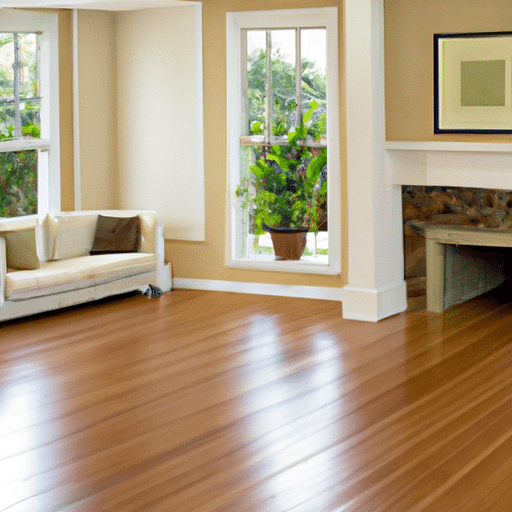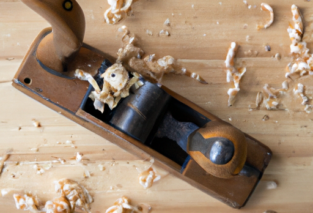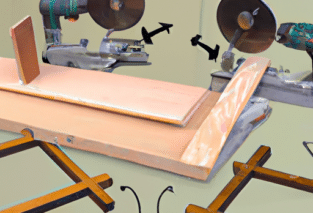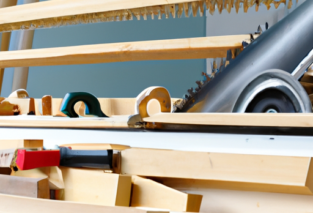In this article, you’ll learn about the advantages and disadvantages of using hardwood flooring in your home. We’ll discuss the benefits of hardwood flooring, such as its durability and timeless beauty, as well as the drawbacks, such as its high cost and vulnerability to moisture damage. By the end of this article, you’ll have a better understanding of whether hardwood flooring is the right choice for your needs.

Introduction
Hardwood flooring is a popular choice for homeowners due to its durability, aesthetic appeal, and long-lasting nature. It adds a natural and timeless beauty to any space and can significantly increase the value of a property. However, like any other flooring option, hardwood flooring also has its drawbacks. In this article, we will explore the advantages and disadvantages of using hardwood flooring in your home.

Advantages of Hardwood Flooring
Durability and Longevity
One of the primary advantages of hardwood flooring is its durability and longevity. When properly maintained, hardwood floors can last for decades, making them a worthwhile investment. Unlike other flooring options that may need to be replaced after a few years, hardwood floors can withstand heavy foot traffic and are resistant to wear and tear. This makes them especially suitable for high-traffic areas such as hallways and living rooms.
Enhanced Aesthetic Appeal
Hardwood flooring adds a touch of elegance and sophistication to any space. Its natural beauty and timeless charm never go out of style. With a wide variety of wood species, colors, and finishes to choose from, hardwood floors can complement any interior design style – from traditional to contemporary. The grains and patterns in the wood add depth and character to the flooring, creating a warm and inviting atmosphere in your home.
Ease of Maintenance
When it comes to maintenance, hardwood floors are relatively easy to clean and maintain. Unlike carpets that trap dust, pollen, and other allergens, hardwood floors are smooth and easy to sweep or vacuum. Regular sweeping and occasional mopping are usually sufficient to keep them looking pristine. Additionally, hardwood floors are stain-resistant, making it easier to clean up spills and accidents. With minimal effort, your hardwood floors can retain their beauty for years to come.
Improved Air Quality
Another advantage of hardwood flooring is its impact on indoor air quality. Unlike carpets that hold onto dust, pet dander, and other allergens, hardwood floors do not trap these particles. This makes hardwood floors a healthier option for individuals with respiratory issues or allergies. By eliminating these irritants, hardwood flooring promotes better indoor air quality, creating a cleaner and healthier living environment.
Increased Property Value
Homes with hardwood flooring generally have higher resale values. Hardwood floors are considered a premium flooring option and can significantly enhance the overall value and appeal of a property. Potential buyers are often willing to pay more for a home with hardwood flooring due to its durability, timeless beauty, and long-lasting nature. Installing hardwood flooring can be seen as a long-term investment that can provide a good return if you decide to sell your home.
Disadvantages of Hardwood Flooring
High Initial Cost
While hardwood flooring offers numerous benefits, it does come with a higher initial cost compared to other flooring options. The cost of hardwood flooring includes the price of the materials as well as the installation expenses. The price per square foot can vary depending on the type of wood and the complexity of the installation process. However, it is important to keep in mind that hardwood floors can significantly increase the value of your property, making it worthwhile in the long run.
Vulnerable to Moisture Damage
One of the major drawbacks of hardwood flooring is its vulnerability to moisture damage. Excessive moisture can cause the wood to warp, swell, or even rot. It is not recommended to install hardwood flooring in areas prone to high humidity or frequent water exposure, such as bathrooms or basements. Spills and accidents should be promptly cleaned up to avoid water seeping into the wood and causing damage. Regular maintenance and proper sealing can help minimize the risk of moisture-related issues.
Prone to Scratches and Dents
While hardwood floors are durable, they are not immune to scratches and dents. Heavy furniture, high heels, or pet claws can leave marks on the surface of the wood. However, these imperfections can often add character to the flooring, giving it a distressed or lived-in look. If these scratches and dents become bothersome, they can be easily repaired through sanding and refinishing the affected area. Regular use of floor protectors on furniture legs and area rugs can also help prevent damage.
Requires Regular Maintenance
To keep hardwood floors looking their best, regular maintenance is essential. This includes sweeping or vacuuming to remove dust and dirt, as well as periodic mopping with a recommended hardwood floor cleaner. Additionally, hardwood floors need to be refinished periodically to maintain their appearance and protect the wood from wear and tear. The frequency of refinishing depends on factors such as the type of wood and the level of foot traffic in the area. While regular maintenance can be time-consuming, the beauty and longevity of hardwood flooring make it a worthwhile investment.
Difficult Installation Process
Installing hardwood flooring is not a simple DIY project and often requires professional help. The installation process involves precise measurements, cutting, and fitting the hardwood planks, as well as properly sealing and securing them to the subfloor. Improper installation can lead to gaps, uneven flooring, or other issues that can compromise the integrity of the floor. Hiring a professional ensures that the installation is done correctly, guaranteeing the longevity and beauty of your hardwood floors.
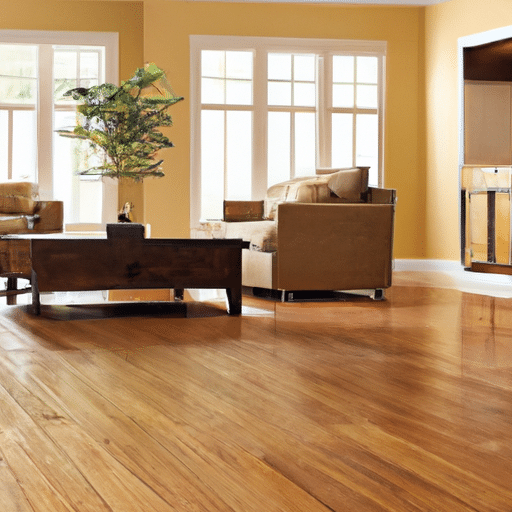
Conclusion
Hardwood flooring offers numerous advantages such as durability, aesthetic appeal, ease of maintenance, improved air quality, and increased property value. However, it also has its drawbacks including a higher initial cost, vulnerability to moisture damage, susceptibility to scratches and dents, the need for regular maintenance, and the complexity of the installation process. Before deciding to use hardwood flooring in your home, it is essential to consider these factors and weigh the pros and cons. If you value timeless beauty, durability, and the ability to enhance the value of your property, hardwood flooring may be the perfect choice for you.
